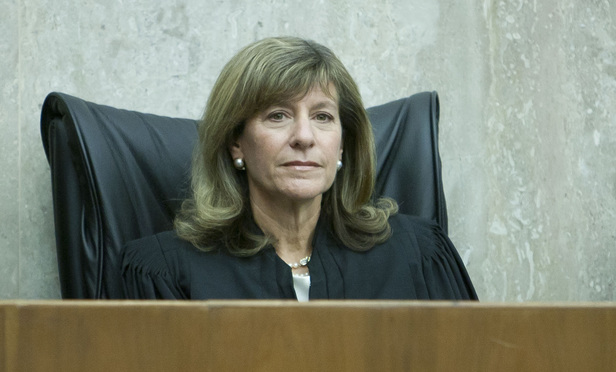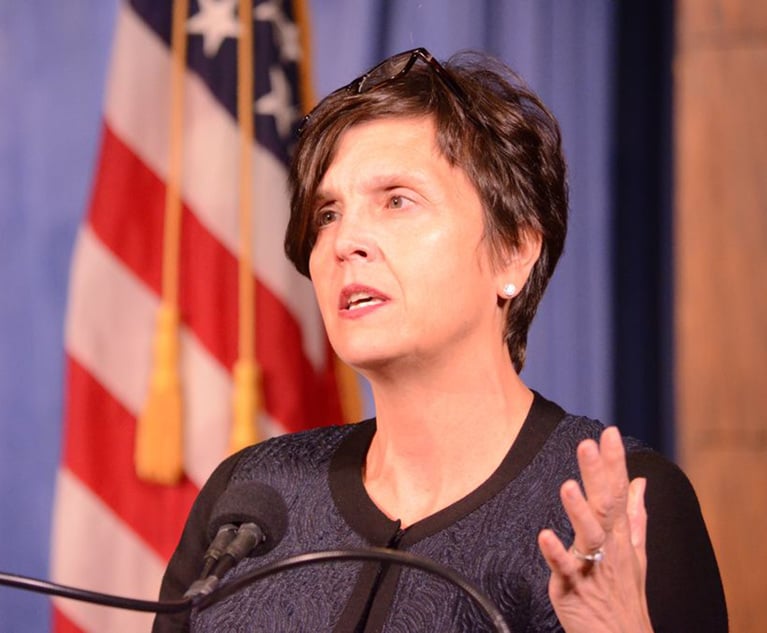Roger Stone Gets 2-Week Pause on Prison Time After Judge Nixes 2-Month Request
The judge said Stone must remain in home confinement during that time.
June 26, 2020 at 06:32 PM
5 minute read
 District Judge Amy Berman Jackson, U.S. District Court for the District of Columbia. (Photo: Diego M. Radzinschi/ALM)
District Judge Amy Berman Jackson, U.S. District Court for the District of Columbia. (Photo: Diego M. Radzinschi/ALM)
U.S. District Judge Amy Berman Jackson on Friday granted Roger Stone a two-week delay of his prison surrender date, short of the two month postponement he sought citing concerns over the COVID-19 pandemic.
In a minute order, Jackson wrote the delay "affords the defendant seventy-five days beyond his original report date." A jury returned a guilty verdict against Stone in November, but his report date was not set until Jackson denied his motion for a new trial in April.
The federal judge also said Stone must remain in home confinement during that time, referencing a memorandum from the attorney general "and the strong medical recommendation submitted to the court by the defense." She said pretrial services could monitor Stone to make sure he complies with the order, if needed.
"This will address the defendant's stated medical concerns during the current increase of reported cases in Florida, and Broward County in particular, and it will respect and protect the health of other inmates who share defendant's anxiety over the potential introduction and spread of the virus at this now-unaffected facility," Jackson wrote.
Jackson also indicated that she included a sealed opinion alongside her order, but believes the document "could be unsealed in its entirety because while it refers to sealed pleadings, it does not identify any medical condition or conditions or contain any private medical information." She requested the parties tell her by Monday about whether they believe the opinion can be unsealed and if any portions of it should be redacted.
Stone's docket indicates that there are several sealed filings entered with the court surrounding his surrender date. His attorneys have filed medical records under seal as part of their argument to delay the report date.
Stone earlier this week filed the motion to push off his original surrender date of June 30, citing the COVID-19 pandemic and his medical conditions. The same day the motion was filed, the House Judiciary Committee released the written testimony of a former prosecutor on the case, alleging that DOJ officials pushed for a lighter sentence recommendation for Stone due to his ties to President Donald Trump.
Stone's filing, signed by his attorneys, Grant Smith and Seth Ginsberg, said the Department of Justice did not oppose the motion. But Jackson requested that DOJ officials file a separate brief laying out the reasoning for their position, including any department policies on agreeing to delay surrender dates and similar cases where prosecutors took the same stance.
In a filing late Thursday, prosecutors with the U.S. Attorney's Office for the District of Columbia told Jackson they did not oppose the motion under a department policy instructing prosecutors to do so for cases during the COVID-19 pandemic. Correctional facilities are a hot spot for the virus.
"For that reason—and that reason only—the U.S. Attorney's Office for the District of Columbia does not oppose defendant Roger J. Stone's request to extend his voluntary surrender date for up to 60 days," the prosecutors wrote.
In a separate filing Friday, also made at Jackson's request, Stone's attorneys wrote they had requested on June 1 that Stone's surrender date be pushed to June 30 but did not hear back from the Bureau of Prisons.
"On or about June 10, 2020, government counsel informed undersigned counsel that he had been in contact with BOP and had been informed that BOP was no longer extending surrender dates based on COVID-19 and that, therefore, BOP would not be changing Stone's June 30, 2020 surrender date. BOP's determination led to discussions between the parties that ultimately resulted in Stone's decision to file his Unopposed Motion to Extend Surrender Date," the filing reads.
Prosecutors said in Thursday's filing that Stone's surrender date was set in mid-April and included an email among Bureau of Prisons authorities discussing the scheduled date and Stone's health issues in light of the pandemic.
A Washington, D.C., jury last year found Stone guilty of all charges brought forward by Special Counsel Robert Mueller III, including lying to the House Intelligence Committee about the identity of intermediary to WikiLeaks ahead of the 2016 election and witness tampering.
Read more:
DOJ Tells Judge: COVID-19, Not Politics, Is Behind Stalling Roger Stone's Prison Time
Divided DC Circuit Orders Flynn Judge to Dismiss Prosecution at Trump DOJ's Request
Jonathan Kravis, Prosecutor Who Opposed Barr in Stone Case, Joins Munger Tolles
'Berman Will Be Fine': Some Think Spat Might Help Ex-US Attorney's Career Prospects
This content has been archived. It is available through our partners, LexisNexis® and Bloomberg Law.
To view this content, please continue to their sites.
Not a Lexis Subscriber?
Subscribe Now
Not a Bloomberg Law Subscriber?
Subscribe Now
NOT FOR REPRINT
© 2025 ALM Global, LLC, All Rights Reserved. Request academic re-use from www.copyright.com. All other uses, submit a request to [email protected]. For more information visit Asset & Logo Licensing.
You Might Like
View All
Skadden and Steptoe, Defending Amex GBT, Blasts Biden DOJ's Antitrust Lawsuit Over Merger Proposal
4 minute read
'Lack of Independence' or 'Tethered to the Law'? Witnesses Speak on Bondi
4 minute read
Trending Stories
- 1Paul Hastings, Recruiting From Davis Polk, Continues Finance Practice Build
- 2Chancery: Common Stock Worthless in 'Jacobson v. Akademos' and Transaction Was Entirely Fair
- 3'We Neither Like Nor Dislike the Fifth Circuit'
- 4Local Boutique Expands Significantly, Hiring Litigator Who Won $63M Verdict Against City of Miami Commissioner
- 5Senior Associates' Billing Rates See The Biggest Jump
Who Got The Work
J. Brugh Lower of Gibbons has entered an appearance for industrial equipment supplier Devco Corporation in a pending trademark infringement lawsuit. The suit, accusing the defendant of selling knock-off Graco products, was filed Dec. 18 in New Jersey District Court by Rivkin Radler on behalf of Graco Inc. and Graco Minnesota. The case, assigned to U.S. District Judge Zahid N. Quraishi, is 3:24-cv-11294, Graco Inc. et al v. Devco Corporation.
Who Got The Work
Rebecca Maller-Stein and Kent A. Yalowitz of Arnold & Porter Kaye Scholer have entered their appearances for Hanaco Venture Capital and its executives, Lior Prosor and David Frankel, in a pending securities lawsuit. The action, filed on Dec. 24 in New York Southern District Court by Zell, Aron & Co. on behalf of Goldeneye Advisors, accuses the defendants of negligently and fraudulently managing the plaintiff's $1 million investment. The case, assigned to U.S. District Judge Vernon S. Broderick, is 1:24-cv-09918, Goldeneye Advisors, LLC v. Hanaco Venture Capital, Ltd. et al.
Who Got The Work
Attorneys from A&O Shearman has stepped in as defense counsel for Toronto-Dominion Bank and other defendants in a pending securities class action. The suit, filed Dec. 11 in New York Southern District Court by Bleichmar Fonti & Auld, accuses the defendants of concealing the bank's 'pervasive' deficiencies in regards to its compliance with the Bank Secrecy Act and the quality of its anti-money laundering controls. The case, assigned to U.S. District Judge Arun Subramanian, is 1:24-cv-09445, Gonzalez v. The Toronto-Dominion Bank et al.
Who Got The Work
Crown Castle International, a Pennsylvania company providing shared communications infrastructure, has turned to Luke D. Wolf of Gordon Rees Scully Mansukhani to fend off a pending breach-of-contract lawsuit. The court action, filed Nov. 25 in Michigan Eastern District Court by Hooper Hathaway PC on behalf of The Town Residences LLC, accuses Crown Castle of failing to transfer approximately $30,000 in utility payments from T-Mobile in breach of a roof-top lease and assignment agreement. The case, assigned to U.S. District Judge Susan K. Declercq, is 2:24-cv-13131, The Town Residences LLC v. T-Mobile US, Inc. et al.
Who Got The Work
Wilfred P. Coronato and Daniel M. Schwartz of McCarter & English have stepped in as defense counsel to Electrolux Home Products Inc. in a pending product liability lawsuit. The court action, filed Nov. 26 in New York Eastern District Court by Poulos Lopiccolo PC and Nagel Rice LLP on behalf of David Stern, alleges that the defendant's refrigerators’ drawers and shelving repeatedly break and fall apart within months after purchase. The case, assigned to U.S. District Judge Joan M. Azrack, is 2:24-cv-08204, Stern v. Electrolux Home Products, Inc.











